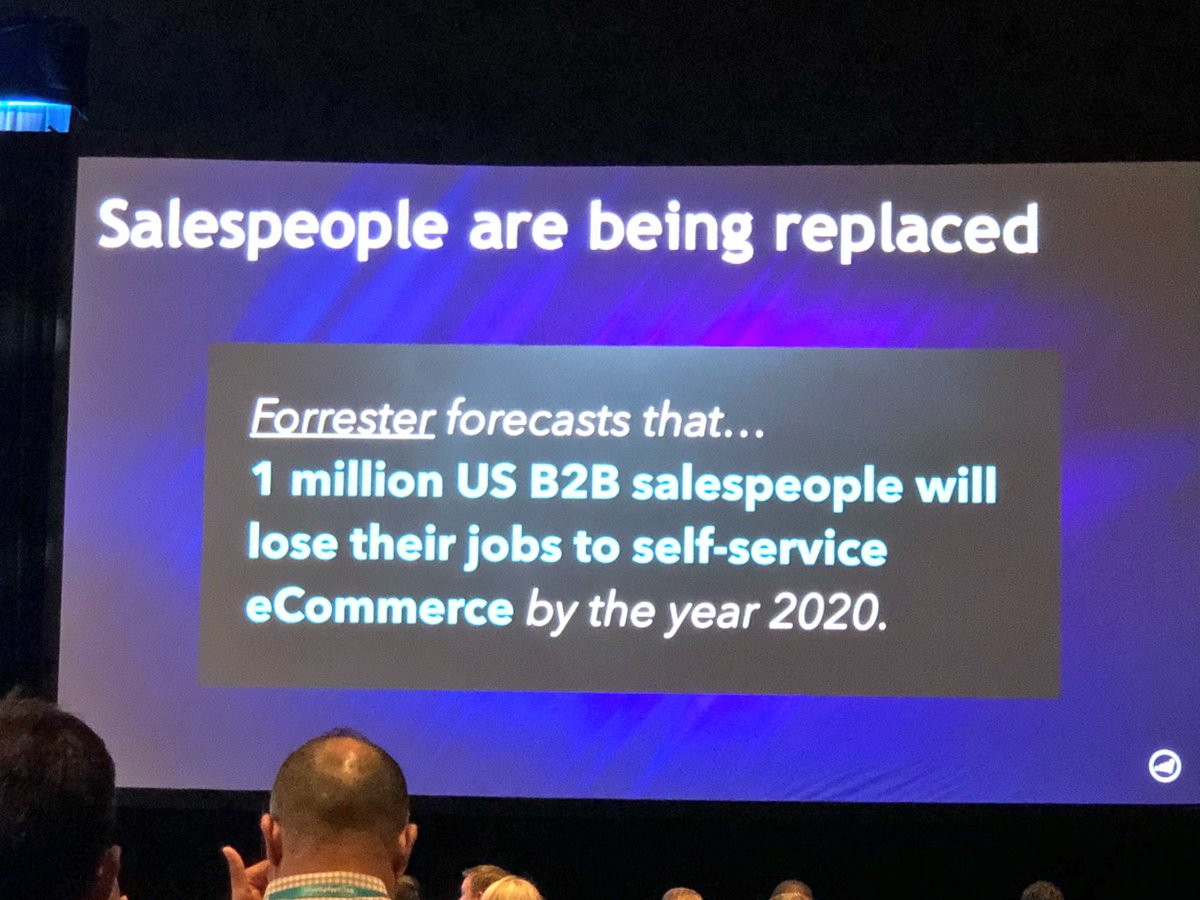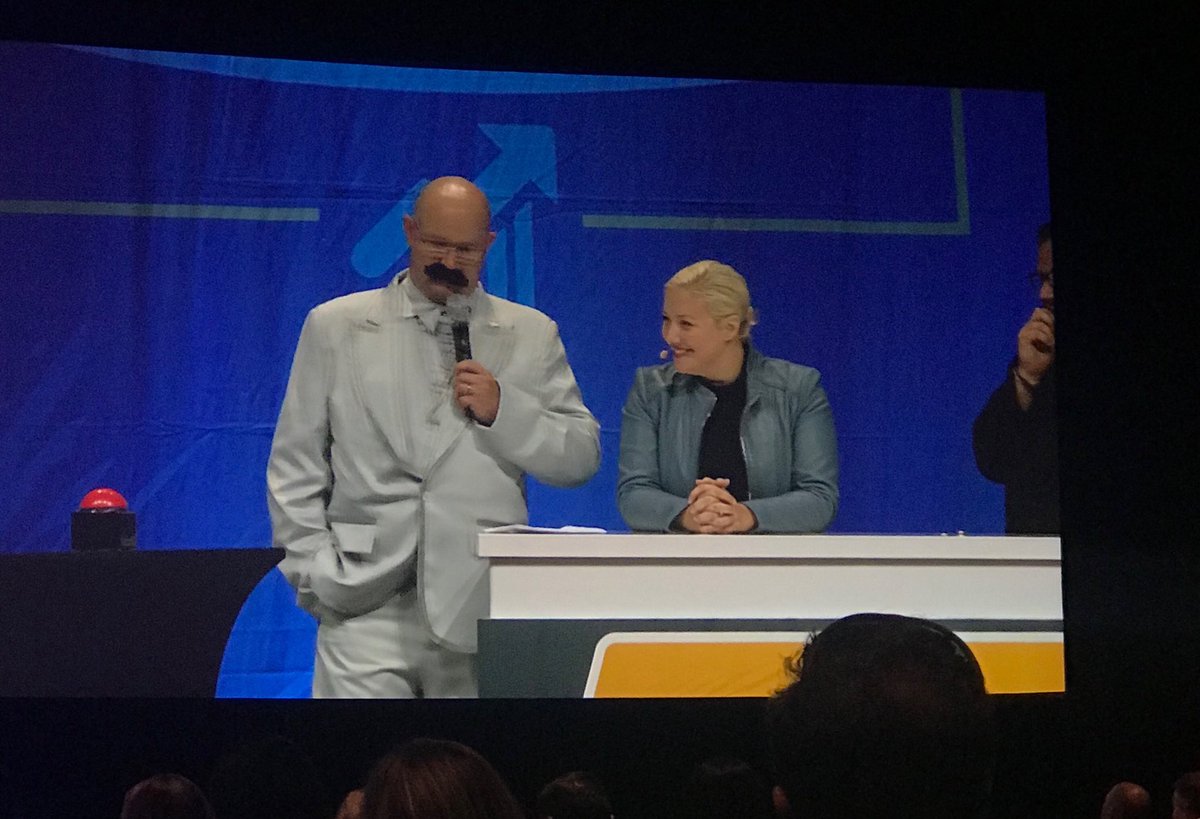Will 1M Sales Reps Lose Their Job in 2020? Let’s Clarify this Bombshell for B2B
Every week(ish) I send out new ideas, writings, and interesting links on marketing, business, and life. It’s free & curated by me. Get on the list.
It was an inflammatory prediction:
1 million sales reps will lose their jobs by 2020
The originating study, "Death of a (B2B) Salesman," by then-Forrester analyst Andy Hoar in 2015, projected that 22% of the 4.5M B2B sales agents in the US that year would lose their jobs to eCommerce by 2020. The follow-on report two years later continued the narrative.
The stat was recently unearthed this past week at the 2018 FlipMyFunnel event in Boston by sales industry revivalist Jill Rowley, Chief Growth Officer at Marketo, during her closing keynote.
I shared the slide on Twitter, and the responses were swift:
"I don't believe that for a second."
"Reps are not going away."
"Number replaced so far =0" (Quick note: This one came from Tom Goodwin, who I absolutely adore for his contrarian ways, so to have him part of this thread put a big smile on my face.)
"I'm guessing this won't be accurate in 2020."
Now, social media "conversations" are often just reactionary comments back and forth. The rise of angsty political arguments is a great example.
I felt it was important to clarify this report, what it's truly saying, and what B2B teams need to do about it, especially in light of the rise of ABM.
Clarifying the statement
First of all - Forrester is saying those most likely to lose their jobs are those who currently take orders for commodity products. Here's a breakdown (source):
"Order takers,” who generally process orders that customers could easily place through online self-service. Job loss: 33%, or close to 550,000 out of 1.6 million jobs;
"Explainers,” who provide buyers with more information about complex products. Job loss: 25%, or close to 400,000 out of 1.5 million jobs;
”Navigators,” who help buyers understand what their own companies need to purchase. Job loss: 15%, or close to 150,000 out of 900,000 jobs;
”Consultants,” who have extensive knowledge about the buyer’s company to help the buyer understand what her company needs to purchase. Job gain: 10%, to 550,000 from 500,000.
From the author of the report:
“Order takers are the ones in trouble,” he says. “ It all comes down to value in the ordering process—whether sales reps add value or not.”
Not so unreasonable
The study found that by a factor of 3 to 1, B2B buyers want to self-educate themselves by going to sellers’ websites to learn about offerings, and a majority of buyers prefer to make purchases online.
That’s a truth every marketer I know has accepted. Is it really so hard to believe the antiquated role of salesperson-as-information-dealer is gone?
The report makes it clear that B2B sales reps are still preferred by buyers in certain situations, such as for large, complex products procured for and across large enterprises.
Yet even these situations, communications are turning digital:
“They’re increasingly conducting those negotiations with salespeople by way of digital means such as email, [live] chat, and collaborative software as opposed to via a traditional phone call."
Aligned to the rise of B2B eCommerce:
Andy Hoar is no longer with Forrester, but is still evangelizing the rise of B2B eCommerce. Backed by major industry indications, like Adobe's acquisition of Magento four months ago for $1.68B, this is no passing fad.
By 2020, the global B2B eCommerce market will be 2X as large as the B2C market — $6.7 trillion vs. $3.2 trillion — according to Frost & Sullivan.
My friends at Mirakl produced a helpful glance at where Amazon is disrupting the B2B purchase process for many types of products:
In many cases, B2B brand manufacturers do not know how to apply the tenants of this emerging digital opportunity to their business. But those that do see massive gains in revenue, profitability, and customer engagement.
All this indicates is the undeniable evolution of B2B selling...
The salesperson is not going away.
The salesperson is not going away.
The salesperson is not going away.
The salesperson is not going away.
The point of this report, Jill’s talk, and my article here is that we must accept the new role of salespeople as value-drivers, relationship managers, and catalysts of change.
For 50 years, pundits have repeatedly proclaimed that salespeople would soon be rendered obsolete by the emerging media or technologies of the day: catalogs, telemarketing, dot-coms, online reverse auctions, and now digital search. Each time, salespeople survived. How? They evolved.
Truly, it’s a turning point in our industry.
Following the hype, for better or for worse, many organizations are adopting ABM. 1,000 showed up at this most recent ABM conference. According to SiriusDecisions, 92% of B2B marketers consider ABM “extremely” or “very” important to their marketing efforts.
On stage, the team at LogMeIn admitted the hype got them thinking about it – and they've invested well over a year in making the switch from lead-based demand generation. (And seeing great results with 71% account penetration, 17% account-to-opportunity conversion, and Marketing attributed for driving 20% of the company’s overall pipeline.)
As the community of B2B shifts further towards adoption of ABM, many orgs are wondering how best to equip their sales teams to be effective.
The right kind of salesperson for a world of commoditization and ABM
For complex deals, I like how this HBR post describes today's field salesperson:
...educator, negotiator, consultant, solution configurator, service provider, and relationship manager. They are integral to discovering the “something more” that customers want. As customers will tell you, a salesperson must add value by becoming part of the product or solution.
B2B purchases are made based on the perceived value – not only cost, but total worth of an offering. Simply put - salespeople must be part of that perceived value.
David Skok says: “Customers hate being sold to. They don’t mind getting expert help when they want to buy something. But much of the time they are not ready to buy, and one of the most irritating things is to have a salesperson try to get them to buy when they aren’t ready."
Marketing's role in this evolution.
Modern sales teams need partnership from marketers in two areas: Messaging and sales enablement.
Sales enablement has never been more important. What makes a salesperson great today is her ability to utilize insight and tools from a customer-focused, sales-empathetic marketing team.
We must help our sales counterparts understand what kind of message breaks through to accounts and prospects. This is an joint adapt-or-die situation.
According to an ITSMA survey, the three most important factors in shortlisting and making a final decision on an enterprise sale are:
1. Knowledge and understanding of unique business issues
2. Knowledge and understanding of industry
3. Fresh ideas to advance business
(Source: Engagio)
Marketers, are you helping your sales team look - and sound - like experts? Are they equipped to utilize the company's thought leadership in the sales process? Do they even know where to find it?
“Deals move when the rep translates the broad insights into value that is specific for that account.“ Jon Miller, CEO, Engagio
Our account-based messaging and what we equip sales with needs to help them work with prospects to uncover a business challenge or opportunity - and frame it in a new way.
During this week's event, Craig Rosenberg of TOPO shared four keys to a relevant message:
Educate on the space
Contextualize to my business
Prescribe a plan of action
Experience the process and outcome
Marketers, does your ABM content match the above? Is it more of the same? Are you providing sales with original POV on the market? Can you help them concisely navigate changing industry waters? Do you understand your buyer well enough to stay ahead of the curve?
Most importantly: Does your brand deliver on these promises - before a prospect ever makes contact with your team?
Salespeople aren't going away. For smaller B2B goods, we can't deny the shift to B2B eCommerce. But ABM is raising the bar for companies bringing complex deals to market - fundamentally changing both the role of sales and marketing in the joint battle to remain relevant and drive growth.
--
Thanks to the team at FlipMyFunnel for having me at this week's event. I would hate to miss this opportunity to expose the brilliance of Matt Heinz dressed as Steve Harvey for our "Family Feud: Sales vs Marketing" keynote:
Amazing.
Every week(ish) I send out new ideas, writings, and interesting links on marketing, business, and life. It’s free & curated by me. Get on the list.


